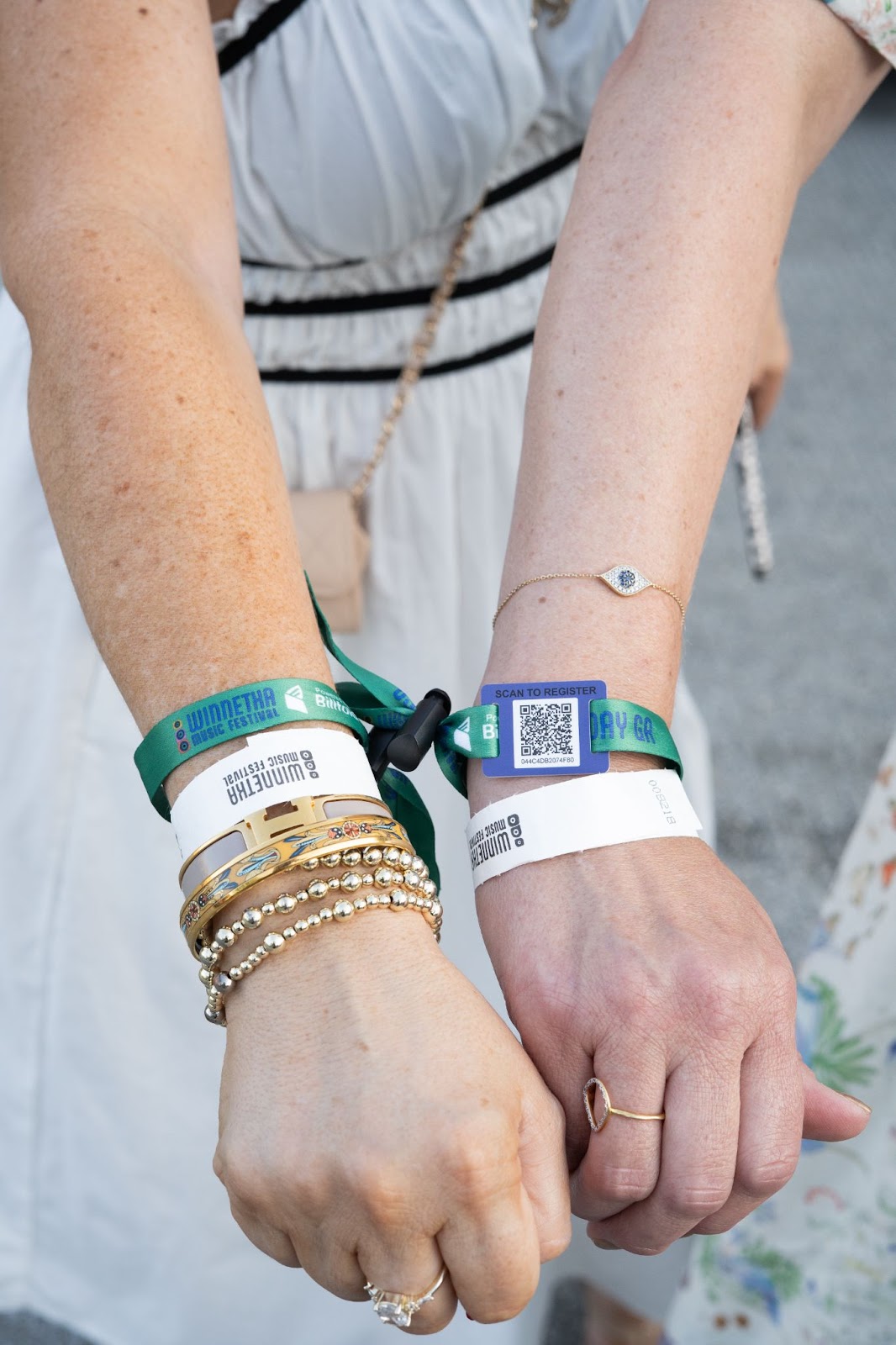RFID Cashless Ticketing: Faster Entry, Happier Guests

RFID cashless ticketing eliminates entry bottlenecks and transforms the guest experience with lightning-fast access.
- Lightning-fast processing reduces entry wait times dramatically compared to traditional systems
- Significant revenue increases through faster transactions and increased guest spending
- Enhanced security with encrypted data transmission and anti-counterfeiting protection
- Future-ready technology positioned for the $32.3 billion smart ticketing market by 2032
Bottom line: Events adopting RFID cashless systems see measurable improvements in guest satisfaction, operational efficiency, and bottom-line results.
Long lines snaking around event venues. Frustrated guests fumbling with cash. Security concerns over ticket fraud. These pain points plague traditional ticketing systems, creating friction that damages the guest experience before events even begin. The solution lies in embracing contactless technology that transforms how attendees access and engage with events.
RFID cashless ticketing represents a fundamental shift from outdated entry processes to seamless, technology-driven experiences. With contactless payment adoption growing rapidly across industries, forward-thinking event organizers are recognizing that contactless entry systems aren't just conveniences—they're competitive necessities.
How Does RFID Cashless Ticketing Transform Event Entry?
RFID (Radio Frequency Identification) technology uses electromagnetic fields to automatically identify and track tags attached to objects, people, or tickets. Unlike traditional barcode scanning that requires line-of-sight positioning, RFID systems communicate wirelessly within a range of several inches to several feet.
The magic happens through three core components working in perfect harmony. RFID tags store encrypted digital information on tiny microchips embedded in payment wristbands, cards, or tickets. RFID readers detect and communicate with these tags using radio waves, processing multiple entries simultaneously. Backend software manages the entire system, tracking attendance, processing payments, and providing real-time analytics.
This technological foundation enables processing speeds that traditional systems simply cannot match. While manual ticket verification can take 15-30 seconds per person, RFID systems validate entries in less than one second. The contactless ticketing market is experiencing explosive growth, with projections showing a 16% annual growth rate through 2034, driven primarily by these efficiency gains.
Modern RFID systems support multiple frequency bands, with Ultra-High Frequency (UHF) systems preferred for large-scale events due to their superior range and processing capabilities. This technical superiority translates directly into operational advantages that guests and organizers both appreciate.
Why RFID Cashless Ticketing Beats Traditional Methods
Traditional paper tickets and basic digital systems create multiple friction points that RFID technology eliminates entirely. Physical tickets get lost, damaged, or forgotten, forcing guests into lengthy customer service interactions. Manual scanning requires staff to physically handle each ticket, creating bottlenecks during peak entry periods.
Security vulnerabilities plague traditional systems, with counterfeiting remaining a persistent threat. Paper tickets can be easily duplicated, while basic QR codes offer limited protection against sophisticated fraud attempts. These security gaps cost the event industry millions annually in lost revenue and damaged reputation.
RFID cashless systems address these fundamental weaknesses through advanced encryption and unique identification protocols. Each RFID tag contains encrypted data that's virtually impossible to replicate, providing multiple layers of security protection. The wireless communication between tags and readers happens through secure protocols that prevent unauthorized access or data interception.
Operational efficiency differences become stark during high-volume events. Traditional systems force guests into single-file lines, with each person requiring individual attention from staff members. RFID systems enable multiple simultaneous entries, with readers capable of processing dozens of tags within seconds.
The financial impact extends beyond entry efficiency. Understanding why cashless payment systems are gaining widespread adoption reveals the broader market trends driving this technological shift. Smart ticketing market growth reflects industry recognition that contactless systems drive measurable revenue improvements through reduced operational costs and increased guest spending opportunities.
The Real Benefits Event Organizers Can't Ignore
Revenue acceleration represents the most compelling advantage of RFID cashless ticketing systems. Events implementing these technologies typically see substantial increases in per-guest spending due to frictionless payment experiences. When purchasing becomes as simple as tapping a wristband, guests make more impulse purchases throughout the venue.

Operational costs decrease dramatically as RFID systems require fewer staff members to manage entry points. Traditional events might need 6-8 staff members per major entrance, while RFID systems can operate efficiently with 2-3 staff members handling the same volume. This staffing reduction translates into immediate cost savings that compound over multiple events.
Real-time data collection provides unprecedented insights into guest behavior and preferences. RFID systems track movement patterns, purchase histories, and engagement levels, enabling data-driven decisions about venue layout, vendor placement, and future event planning. This intelligence becomes invaluable for optimizing operations and maximizing revenue opportunities.
Security improvements extend beyond fraud prevention to comprehensive access control. RFID systems can restrict access to specific areas based on ticket types, age verification, or VIP status. Emergency situations become more manageable with precise headcount data and the ability to quickly identify all individuals within specific venue areas.
Environmental benefits align with growing sustainability commitments, as RFID systems eliminate thousands of paper tickets per event. This waste reduction supports corporate social responsibility goals while appealing to environmentally conscious attendees.
RFID Success Stories: When Festivals Get It Right
Major festivals worldwide have demonstrated the transformative power of RFID cashless ticketing through measurable improvements in guest satisfaction and operational efficiency. Industry reports highlight several prominent examples of successful implementations.
Coachella Valley Music and Arts Festival pioneered large-scale RFID implementation, integrating wristband technology for both entry and payments. Industry analysis indicates significant improvements in entry processing and concession operations through streamlined purchasing processes. The festival's official cashless system enables attendees to preload funds and make contactless transactions throughout the venue.
Lightning in a Bottle has transformed its festival operations through comprehensive RFID implementation, creating a seamless experience that enhances both guest satisfaction and operational efficiency. The festival's adoption of advanced cashless technology delivered a remarkable 36.9% increase in overall sales, demonstrating RFID's effectiveness in demanding outdoor environments where weather resistance and consistent performance are critical.
The system's reliability across multiple festival days, combined with reduced transaction times and increased cashless adoption rates, showcases how RFID technology can drive measurable revenue improvements while elevating the guest experience.
Elements Music & Arts Festival showcases how RFID technology scales effectively for boutique events seeking premium guest experiences. The festival's integrated approach combines access control with sophisticated payment processing, enabling attendees to move effortlessly between stages, vendors, and VIP areas using their RFID wristbands.
Elements' implementation highlights RFID's versatility in supporting diverse event formats while maintaining the intimate atmosphere that defines smaller festivals. The technology's ability to provide detailed analytics has enabled the festival to optimize vendor placement and improve crowd flow management year over year.
European festivals have embraced RFID technology with notable results. Sziget Festival in Hungary implemented comprehensive RFID systems that enabled attendees to preload funds before arrival, creating positive cash flow for organizers. The festival's integrated cashless system demonstrates how contactless payment solutions enable increases in average transaction values as guests spend more freely with streamlined payment options.
Wacken Open Air, one of the world's largest metal festivals, adopted mandatory cashless payment systems using RFID technology. The festival's official documentation highlights operational improvements including faster service at food and beverage stands, reduced cash handling risks, and enhanced security through comprehensive transaction tracking.
These success stories share common themes: improved guest experience, increased revenue, and operational efficiency gains. The festivals that invested early in RFID technology now enjoy competitive advantages that attract both attendees and sponsors seeking cutting-edge event experiences.
Global adoption trends further validate RFID's effectiveness, with India's RFID market expected to grow at 17.9% annually. For US event organizers, this international growth demonstrates the technology's proven scalability and reliability across diverse cultural and operational environments, reducing implementation risks for domestic events.
5 Ways RFID Cashless Ticketing Creates Happier Guests
1. Lightning-Fast Entry Processing RFID systems eliminate the traditional entry bottleneck by processing multiple guests simultaneously. Instead of waiting in single-file lines, attendees simply approach readers and gain instant access. Processing times drop from 15-30 seconds to under one second, dramatically reducing overall wait times and creating smoother entry experiences.
2. Seamless Payment Experiences Cashless transactions through RFID wristbands or cards eliminate the need to carry cash, credit cards, or mobile phones for purchases. Guests preload funds online or at venue kiosks, then make purchases with simple taps throughout the event. This convenience encourages increased spending while reducing transaction friction.
3. Enhanced Security and Peace of Mind RFID technology provides multiple security layers that protect both personal information and financial data. Encrypted communications prevent unauthorized access, while unique identifiers eliminate counterfeiting risks. Guests enjoy events without worrying about lost tickets or stolen cash.
4. Personalized Event Experiences RFID systems enable personalization features that enhance guest engagement. Attendees can link wristbands to social media accounts for instant photo sharing, receive personalized recommendations based on location data, and access exclusive content or experiences based on their ticket types.
5. Effortless Re-Entry and Area Access Traditional events often struggle with re-entry policies and restricted area access. RFID systems seamlessly manage these complexities, allowing authorized re-entry without paperwork or staff verification. VIP areas, age-restricted zones, and special access locations integrate smoothly into the overall event experience.

Implementing RFID Cashless Entry: What You Need to Know
Successful RFID implementation requires careful planning and understanding of technical requirements. The process begins with selecting appropriate RFID frequency bands based on venue size, guest volume, and specific use cases. A comprehensive RFID payment technology guide can help organizers navigate these technical decisions effectively. Ultra-High Frequency (UHF) systems work best for large-scale events, while High Frequency (HF) systems suit smaller venues with closer-proximity interactions. Understanding the differences between RFID, NFC, and EMV technologies helps organizers make informed technology choices.
Infrastructure planning involves strategically positioning RFID readers at entry points, payment locations, and restricted access areas. Reader placement must account for crowd flow patterns, architectural constraints, and interference from other electronic devices. Professional site surveys ensure optimal system performance and coverage.
Staff training becomes crucial for smooth operations, as team members need to understand both technical operations and guest assistance procedures. Training programs should cover reader operation, troubleshooting common issues, and customer service protocols for technology-related questions.
Integration with existing ticketing platforms requires careful coordination to ensure seamless data flow between systems. Modern RFID solutions offer APIs and integration tools that connect with popular ticketing platforms, maintaining operational continuity while adding advanced capabilities.
Testing phases should include small-scale pilots before full deployment. These tests identify potential issues with reader placement, network connectivity, and guest flow patterns. Feedback from pilot events enables refinements that improve the full-scale implementation.
Budget considerations include initial hardware costs, ongoing operational expenses, and potential revenue increases. While RFID systems require upfront investment, the RFID tags segment shows decreasing costs due to technological advances and increased production volumes.
Security protocols must address data protection, payment processing compliance, and guest privacy concerns. Proper implementation includes encryption standards, secure data transmission, and compliance with relevant payment industry regulations.
The Future of Contactless Ticketing Technology
Emerging technologies are rapidly expanding RFID capabilities beyond basic entry and payment functions. Integration with Internet of Things (IoT) sensors enables comprehensive venue monitoring, including crowd density tracking, environmental condition monitoring, and predictive maintenance for venue systems.
Artificial intelligence integration enhances RFID data analysis, providing deeper insights into guest behavior patterns and preferences. Machine learning algorithms identify trends that inform future event planning, vendor optimization, and personalized marketing strategies.
Blockchain technology promises additional security enhancements and transparent transaction recording. Some forward-thinking event organizers are exploring blockchain-backed RFID systems that provide immutable records of all transactions and interactions.
Mobile wallet integration continues evolving, with RFID systems connecting seamlessly to popular payment apps and digital wallets. This integration provides guests with multiple payment options while maintaining the speed and convenience of RFID technology.
The global RFID market projects explosive growth from $9.95 billion in 2022 to $51.45 billion by 2030, reflecting widespread industry adoption across multiple sectors.
Sustainability initiatives are driving innovation in reusable RFID devices and environmentally friendly materials. Future systems will likely emphasize circular economy principles, with RFID tags designed for multiple event uses and responsible disposal programs.
Advanced analytics capabilities will transform RFID data into actionable business intelligence. Predictive analytics will forecast attendance patterns, optimize staffing levels, and identify revenue opportunities in real-time.
FAQ
What is RFID cashless ticketing and how does it work? RFID cashless ticketing uses radio frequency identification technology to enable contactless entry and payments at events. Guests receive RFID-enabled wristbands or cards that communicate wirelessly with readers for instant access and seamless transactions throughout the venue.
How much faster is RFID entry compared to traditional ticketing? RFID systems process entries in under one second compared to 15-30 seconds for traditional manual verification. This speed improvement can reduce entry wait times by up to 70%, significantly enhancing the guest experience.
Is RFID cashless ticketing secure? Yes, RFID systems use advanced encryption and unique identifiers that make counterfeiting virtually impossible. The technology provides multiple security layers including encrypted data transmission and secure payment processing protocols.
What are the main benefits for event organizers? Event organizers typically see 20-30% increases in per-guest spending, reduced staffing requirements, comprehensive real-time analytics, enhanced security, and improved operational efficiency through RFID implementation.
Can RFID systems integrate with existing ticketing platforms? Modern RFID solutions offer APIs and integration tools that connect seamlessly with popular ticketing platforms, maintaining operational continuity while adding advanced contactless capabilities.
Transform Your Event Entry Experience Today
RFID cashless ticketing technology represents more than a simple upgrade to traditional systems—it's a fundamental transformation that addresses every major pain point in event access and guest experience. From lightning-fast entry processing to comprehensive security protection, RFID systems deliver measurable improvements that benefit both organizers and attendees.
The financial case for adoption becomes increasingly compelling as costs decrease and capabilities expand. Events implementing RFID technology consistently report improved guest satisfaction, increased revenue, and operational efficiencies that create sustainable competitive advantages.
Forward-thinking event organizers recognize that contactless technology isn't just about keeping pace with industry trends—it's about setting new standards for guest experience and operational excellence. The events that embrace RFID cashless ticketing today will be the industry leaders that define tomorrow's guest expectations.
Ready to transform your event experience with cutting-edge cashless technology? Contact Billfold to discover how our innovative POS solutions can streamline your operations and delight your guests with seamless, contactless experiences.

